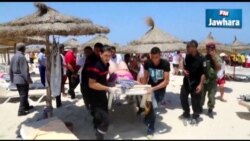Tunisia is under "tremendous pressure" from terrorist attacks as it works to build and enact democratic reforms, according to Tom Malinowski, U.S. assistant secretary of state for democracy, human rights and labor.
Some of that pressure is from neighboring Libya, where attacks by Islamic State-affiliated militants have contributed to regional instability, Malinowski, who visited Tunis earlier this month, told VOA.
Tunisia has done many of the “right things,” including holding free elections and creating “space for civil society,” said Malinowski, who met with Prime Minister Habib Essid and members of parliament.
Malinowski, however, said the country’s reforms are being challenged.
“It is under tremendous pressure right now from a wave of terrorist attacks, which I think are targeting Tunisia precisely because it has taken these creative steps forward in democracy,” said Malinowski.
Tunisia is the birthplace of the Arab Spring movement that began sweeping through the Middle East and North Africa in 2011. During that time, the nation overthrew a dictator and emerged as a democracy.
External, internal challenges
Tunisia, however, continues to face external and internal challenges.
Islamic State-affiliated militants in Libya released Monday a video they say showed the execution of a Tunisian man in Benghazi, claiming he had been spying for Libya’s internationally recognized government.
In June, a gunman killed 38 people in Tunisia’s coastal resort city of Sousse. Tunisian authorities said the gunman trained at a militant camp in Libya.
“Tunisia is cursed in part by being close to Libya,” said Malinowski. “It shares a very long border with Libya and given the situation in Libya with ISIL, gaining a foothold in parts of that country and the chaos that we are trying to end or mitigate, it has created a situation that Tunisia is being the brunt of.”
To lessen the impact of Libya’s instability, Tunisia announced plans in July to build a 168-kilometer-long wall along part of its border with Libya.
Essid said it is one of “many measures” being enacted to help with security.
Porous shared border
The porous shared border has served as a conduit for terrorists, said Karim Mezran, a North Africa analyst at the Atlantic Council.
“Terrorists can get training in Libya, can smuggle weapons, can smuggle between Libya and Tunisia. The border is pretty much open,” he said.
Mezran, however, added that he does not believe in walls. Instead, he said a better investment in Libya to help it deal with instability would have more benefit in the long run.
Some of Tunisia’s problems are internal, said Washington Institute analyst Sarah Feuer.
“Tunisia, it can build all of the walls that it wants,” said Feuer. “But at some point it also has to deal with the security threats emanating within its borders,” she added.
Thousands of Islamic State fighters in Iraq and Syria are thought to be from Tunisia.
US increases assistance
Feuer said the best thing the United States can do is to help Tunisia continue to back its political reforms.
“Tunisia is trying to proceed along this bumpy path to democracy, and the concern is that it is harder to do that if you have a real security threat emanating,” said Feuer.
Malinowski said the U.S. has been “stepping up” assistance to Tunisia to help the government better monitor the flow of people in and out of the country, and to gather better intelligence information.
He also said the U.S. is helping Tunisia train its police forces.










